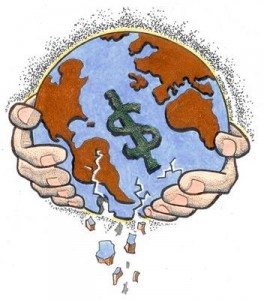 While we all now appreciate the wonder of the Internet and its global reach that connects the world in milliseconds, it’s just a damn shame that the governments of the world have not caught up. Still looking inwardly and only interested in their little patch of turf and, of course, taxes. At the same time, international corporations fare a little better as they pick and choose their profitable markets around the globe and, well, stuff everyone else.
While we all now appreciate the wonder of the Internet and its global reach that connects the world in milliseconds, it’s just a damn shame that the governments of the world have not caught up. Still looking inwardly and only interested in their little patch of turf and, of course, taxes. At the same time, international corporations fare a little better as they pick and choose their profitable markets around the globe and, well, stuff everyone else.
As a self-publisher, I know how Amazon are very selective in what services and products they offer to only limited parts of the world. They also have price variations that do not simply reflect local taxes. After a bit of searching, I found at least 5 different URLs on Amazon pointing to just one of my ebooks. Different prices and different margins. My $2.99 ebook in the US will cost me $3.90 here in Switzerland and £2.21 in the UK. In France and Germany it is Euro 2.99. In Japan, it won’t even tell me (the publisher) the price. Enough to say that if you live outside the US, you’ll be getting ripped off by at least $1.00, if not more. For what? Amazon usually calls it ‘Free International Wireless Transfer.’ I call it theft.
Then there are countries in the world that are blocked by Amazon and are not permitted to even download the Kindle app for their PCs. There goes a few possible sales for me. In fact I get a lot of messages from readers from the Sub-Continent and Asia telling me they have no access to buying my books.
While Amazon allows blogs to be published on Kindle, you’re right out of luck if you are not living in the US. Another no-go zone for non-US customers. Apple fares little better. When I shop for apps or books, I’m predominantly offered German versions and am restricted from accessing products in the US or UK stores. Same goes for iTunes. Well, I suppose I should just love buying Swiss Yodels. What a choice. However, it would be nice for the other halves of Switzerland who speak French, Italian and English to have a little more choice than yodelling in Swiss German.
There is no doubt that most problems on the Internet are caused by the US government’s self-centred tax policies. Although most of the big Internet companies are US-based, this does not mean that they only operate in the US. For other industries, tax is usually calculated in the country of operation. ie: Oil companies and banks. But as has been seen with the Amazon sales tax fiasco in the US, how can tax be charged by the US government on a product manufactured in Portugal, sourced in Spain, warehoused in Ireland and sold in Turkey? However, the US government have other ideas about this.
The same problems arise for any form of income that a non-US resident makes from US-based Internet companies. Generally, if you are not a US citizen, you are penalised. Either by not being able to have your proceeds electronically transferred, reduced by 30% because of US withholding tax or simply forbidden from using the service at all. Good one, Nook!
As a buyer of products on the Internet, I have found that many online stores are based in the US and do not offer delivery outside the US, probably because of the restrictive controls placed upon them by US regulations.
Until the Internet becomes truly global, it will remain a US-centric service controlled by the US government, which will, of course, only look after its own best interests and stuff everyone else.




There’s no way to get around U.S. tax laws, unfortunately. But as I keep saying, whenever the question of limitations and restrictions imposed by Amazon and other distributors comes up, Smashwords has no such limitations.
That’s not true, Catana. I had to get an ITIN just to play at Smashwords and, of course, have the privilege of having 30% of my sales revenue go to the IRS. (I don’t live in a country with a tax treaty with the USA.) And, just to add salt to the wound, I have to rely on their Meatgrinder software to convert my book. I just don’t like relinquishing that much control over my work. So no control AND 30% deducted at source. Yum!
Agree Kaz. Smashwords has the same limitations as any other US company. The only difference is that they do pay by Paypal. Apart from that, they are a pain for formatting and getting approval to distribute to Apple, B&N and Sony.
And I have one other problem. I can’t seem to get a TIN. The US and Swiss are not seeing eye to eye at the moment on tax etc, so that may be the reason I was rejected.
Sorry that I apparently wasn’t clear. I was referring to the ability of non-US readers to buy books without any limitations or artificially inflated costs.
On that point, you’re absolutely correct, Catana. I still don’t like the fact that I lose control, however. Personally, if anyone asks, I send them to XinXii and eat the VAT cost. I’m figuring the time will come when that huge VAT component of 20% comes down to something more reasonable.
The problem is that everyone is trying to mark out a territory where they can make as much money as possible while locking competitors out. I agree with you. It has to shake out eventually. Everybody loses, the way things are right now.
I can only think of one way to describe the current territorial mindset that dominates the web these days:
“You can’t play in my sandbox unsupervised. You can’t play in YOUR sandbox, or I’ll get jealous. You can play with half my toys, but you can’t bring your own into my sandbox. In order to play with my toys, you have to obey my directions.”
The upshot? Content piracy. What I can’t get legally, I will try and obtain by illegal means — that’s what most people think (and do).
All this clinging to a ‘regional’ Internet is only pushing people toward illicit sharing.
Only the other day, it struck me that this is a terrible time to be a musician. The moment your album comes out, some fan — someone who actually *loves* what you do — uploads your whole album to torrent sites and youtube.
I guess you could argue that file-sharing increases awareness of your brand and your art, which it does; also, that it doesn’t lead to loss of sales, because the people who acquire illegal content would never buy it in the first place.
That’s kind of wrong. Time was when I’d buy CDs I liked. Now they’re on YouTube, all I have to do is log in and click on a playlist. I limit myself to buying music I really love. In the age of the eBook, this applies to books as well. (I still buy books, but I’m sentimental, I guess.)
Denying access to content turns that content into forbidden fruit. It’s human nature.
I have to agree Bell. When I can’t (by being geographically restricted) access and buy television programs, movies, music or even sometimes software there is Bittorrent. Piracy? I say no as I began by being prepared to pay. So if my money isn’t good enough to buy it, what do I do?
“While Amazon allows blogs to be published on Kindle, you’re right out of luck if you are not living in the US. Another no-go zone for non-US customers.”
Here in the UK, the links to my blog posts appear on my Amazon UK author page Derek.
I tried loading Nook for PC last year, only to be informed that it was only for US citizens!
The real problem with the US tax regime are the differing brands of tax gathering, depending on what US State you are dealing with, not to mention the Federal tax too.
I did enquire why my blog couldn’t be added to one particular service in the US Jack. I was told that they didn’t want foreign language blogs on their platform. So ergo, British and Australian English are languages that are seen by some as unfit for US consumption.
I am being a little unfair. They did say it was because my IP was in a French speaking geographic location. ‘So does that mean my English is crap?’ I asked but was told that this was their policy.
I hate to be language biased, but perhaps we would do better writing in Spanish.
Just to highlight the unfairness of Silicon Valley, I looked at buying an Apple TV device today. $99.00 on the Apple Store. Great, cheap. But I couldn’t buy from the US store and was redirected to the Swiss Apple Store. The price now was 129 Swiss Francs, which is about $145.00!!
Now forget taxes as sales taxes in Switzerland are next to nothing. 7% at most. So what explains the price difference? I call it robbery.
So I bought something similar from my local cable TV supplier. I love Apple products, But detest being taken for a bloody fool.
Business blogging is rife with benefits for those who utilize it properly, as it adds significant value to a company’s web presence, increasing search engine visibility and encouraging excellent and meaningful interaction from readers, driving an increase of traffic to your website in the process.